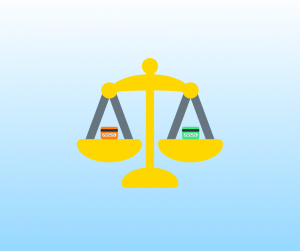What Is Piggybacking for Credit?

A Spotlight on the Staggering Financial Inequalities in America
06/11/2020
How to Protect Your Finances and Credit During the Pandemic
07/31/2020What is credit piggybacking? If you’re not sure what this strange term refers to, you’re definitely not alone.
Credit piggybacking, also referred to as “credit card piggybacking” or “piggybacking credit,” is a commonly used credit-building strategy. However, many people are still unaware of how to access this strategy and use it to their advantage.
In this article, we’ll define what piggybacking for credit means and how it can help your credit.
Credit Piggybacking Definition
The general definition of credit piggybacking is building credit by sharing a credit account with someone else. For example, spouses, business partners, and parents and children are all common examples of people who often share credit.
There are three main ways in which credit piggybacking can take place, which we discuss in more detail in “The Fastest Ways to Build Credit”:

Opening an account with a cosigner or guarantor is one way to piggyback on someone’s good credit.
- Opening an account with a cosigner or guarantor, which is someone who promises to be responsible for the debt if the primary borrower cannot repay it. If the cosigner or guarantor has good credit, the borrower may be able to qualify for credit that they could not qualify for on their own or qualify for better terms.
- Opening a joint account with another person, which means both parties have full access to the account and are both held fully responsible for the account. By opening a joint account with a partner who has good credit, a person with less-than-ideal credit may be able to open an account that they wouldn’t have qualified for on their own or get more favorable terms.
- Becoming an authorized user for the purpose of credit card piggybacking, meaning you are not responsible for the debt, but the entire history of that account may be reflected in your credit file, regardless of when you were added to the account.
When people talk about piggybacking credit, they are usually referring to the method of piggybacking using authorized user tradelines.
How Does Authorized User Piggybacking Work?
Here’s how piggybacking works as an authorized user:
- When you are added as an authorized user to someone’s credit card, often (depending on the bank), the full history of that account will then be shown in your credit report, regardless of when you were added to the card.
- Therefore, piggybacking can almost instantly add years of perfect payment history to the authorized user’s credit file.
- Authorized user tradelines can affect many important credit variables, such as your average age of accounts, the age of your oldest account, your overall utilization ratio, the number of accounts, the mix of accounts, and more.
- Historically, only the wealthy and privileged were able to use piggybacking as a credit-building strategy. Now, there is a marketplace where tradelines can be bought and sold, which is helping to democratize the credit system and provide equal credit opportunity.
Be sure to read the other articles in our Knowledge Center to get all the details on how tradelines work.

The issue of piggybacking went all the way to Congress, which upheld consumers’ rights to use authorized user tradelines.
Is Piggybacking Credit Legal?
While Tradeline Supply Company, LLC does not provide legal advice, we can provide evidence that supports the idea that piggybacking credit is legal.
Firstly, piggybacking for credit is an extremely common practice that has been in use since the advent of credit cards. Studies estimate that 20-30% of Americans who have credit records have authorized user accounts in their credit file.
In addition, about 25% of people who have credit reports initially established their credit files by piggybacking in one way or another.
Many banks actually encourage consumers to add authorized users for the express purpose of boosting their credit scores.
You may have heard about FICO trying to take away authorized user privileges in 2008. But what you probably didn’t hear about was FICO backing down after a congressional hearing that involved the Federal Trade Commission and Federal Reserve Board.
During the hearing, FICO admitted that they could not legally discriminate between spousal AUs and other users, because this would unlawfully violate the Equal Credit Opportunity Act.
Since the U.S. Congress has upheld consumers’ rights to use authorized user tradelines, it seems reasonable to conclude that authorized user tradelines are legal.
For more information on this topic, check out our article, “Are Tradelines Legal?”
However, it is important to get your tradelines from a reputable source. Some tradeline companies use illegal credit profile numbers (also known as CPNs) to mislead creditors as well as consumers. That’s why consumers should only work with tradeline companies that don’t use or sell CPNs—learn more about CPNs and why Tradeline Supply Company, LLC does not accept them.
Does Piggybacking Credit Still Work?
As we discussed in “Do Tradelines Still Work in 2024?”, credit piggybacking still works, and we think it will be around for a long time.
Piggybacking credit is a well-established credit-building strategy that has been defended in Congress and promoted by banks. It is a significant part of our credit system.
Thanks to the Equal Opportunity Credit Act, authorized user tradelines are still a very important factor in credit scoring models.
Not only that, but even if FICO were to devise an algorithm intended to exclude piggybackers, it would be quite some time before lenders could implement it on a large scale. The slow-moving financial industry is still using FICO scores that were developed decades ago.

Piggybacking companies bring together buyers and sellers of authorized user tradelines.
What Do Piggybacking Companies Do?
Friends and family will often allow each other to piggyback, but for many people, it’s difficult to find someone with good credit to piggyback on. A third party can play a role in helping to connect people who are looking to purchase seasoned tradelines with people who have high-quality tradelines to offer.
Piggybacking companies, more commonly referred to as tradeline companies, simply facilitate the buying and selling of authorized user tradelines.
The tradeline company acts as an intermediary by marketing the tradelines to consumers, protecting the identities of the clients, and preventing fraud.
At Tradeline Supply Company, LLC, we provide an innovative platform through which users can buy and sell tradelines entirely online. We also provide educational resources so consumers can familiarize themselves with the credit system and how piggybacking works.
How Long Does Piggybacking Credit Take Before I See the Tradelines on My Credit Report?
The account you are piggybacking on can show up on your credit report in as little as 11 days, depending on several factors relating to the particular tradeline.
Each piggybacking tradeline has its own reporting cycle, and Tradeline Supply Company, LLC provides a purchase deadline before which you must purchase your tradeline in order for us to guarantee that it will post in the coming reporting cycle. If you miss the purchase deadline, it will simply show up in the following cycle.
If you have purchased a seasoned tradeline that you believe has not posted, first, check to make sure that the entire reporting period has passed, then check your credit reporting service again to verify that it still has not posted. If you take these steps and determine your tradeline has not posted, please reach out to us for support and we will rectify the situation.
Can Piggybacking Hurt Credit?
If credit piggybacking is done incorrectly, it can actually backfire and hurt your credit.

Because the full history of the credit account is reflected in the credit file of the piggybacker, that means any derogatory factors will show up, too.
For example, if the account has any late or missed payments, that could hurt the authorized user rather than help. Similarly, a high utilization ratio on the account could also damage the authorized user’s credit.
That’s why we recommend going with a reputable piggybacking company who guarantees a perfect payment history and a low utilization ratio (15% or lower) on all tradelines. This will virtually eliminate the risk of your credit being hurt by these factors.
The only other way piggybacking could hurt your credit is if you choose the wrong piggybacking credit card. It’s essential to choose the right tradelines for your credit file. To do this, you’ll need to figure out your average age of accounts and how adding a tradeline could affect this statistic.
For example, if your average age of accounts is five years and you decide to piggyback on a tradeline that is two years old, this would bring down your average age of accounts, which is the opposite of what you want to achieve with tradelines.
For this reason, it’s important to use our tradeline calculator to see where you stand and to check out our tradeline buyer’s guide before you choose a tradeline.
Let us know if this article on piggybacking for credit helped you, and please share it with your friends!





12 Comments
Have 16 store and credit cards between my wife and I. Looking to just get $400 a month form piggybacking our cards.
It all depends on the card details. We don’t accept any store cards. Enter your email here for an instant quote: https://tradelinesupply.com/credit-partners/
Good afternoon u guys have the AU program which u pay people with good credit to add AU to there cards ?
Yes, you can get started here: https://tradelinesupply.com/credit-partners/
I need a get on a card with a 12 year credit history and a 15k limit.
When browsing our tradeline list, you can make it easy to find what you need by clicking on the headers to sort the list by date opened or credit limit!
I need co to help me boost my credit
I been in prison for 9 years, my credit history is 0,I need to trade line in order to boost my score up.
How much can the AU purchase with the trade lines cards?
Hi Barbara, the AU does not receive a card and cannot make purchases. Purchasing a tradeline is only for the purpose of having the tradeline post to your credit reports.
Hi my question is does this website do AU program can I pay here to be added as a AU?
Hello, you can purchase AU tradelines here: https://tradelinesupply.com/pricing/